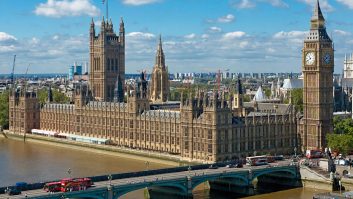Figures from across the UK’s media and entertainment sector have reacted to the new Chancellor’s first budget.
In her first Budget speech, Chancellor of the Exchequer, Rachel Reeves MP, announced a forthcoming tax relief package aimed at reducing costs for visual effects (VFX) production for our “world-beating creative industries.”

From April 2025, film and high-end TV productions will be able to claim an enhanced 39 per cent rate of Audio-Visual Expenditure Credit on their UK VFX costs. Additionally, UK VFX costs will be exempt from the Audio-Visual Expenditure Credit’s 80 per cent cap on qualifying expenditure. Costs incurred from 1st January 2025 will be eligible.
The budget announcement has been broadly welcomed by the UK’s creative industry, with UK Screen Alliance stating the country is set to attract an additional £175 million per year of film and TV VFX spending, creating 2,800 new jobs. The government had previously identified the sector as a “growth driver” in its Industrial Strategy, unveiled earlier this month at its International Investment Summit.
UK Screen Alliance had campaigned for the removal of the cap and a more competitive rate of credit. Following the Chancellor’s speech, Neil Hatton, the organisation’s CEO, said: “The confirmation in the Budget that the VFX rebate will be available from the New Year is terrific news for the UK’s visual effects companies. We know that productions are making decisions right now on where to place their VFX work for 2025 and beyond. Today’s announcement means that these clients will be incentivised to place many millions of dollars of inward investment work with the UK’s award-winning VFX community, creating considerable value for the UK economy.”
His sentiments were echoed by figures representing a broad cross-section of the creative community:
Sir William Sargent, chairman, Framestore Company 3, said: “The UK’s place at the heart of the global visual effects industry has been hard-fought, and these changes represent a significant step forward. This is a highly skilled, highly creative and highly innovative sector with technology at its heart, and the strides we make across film, TV, advertising and immersive experiences have wide-ranging benefits for a wide range of industries. As the impact of emerging technologies continues to grow, it is more vital than ever that we future-proof the UK as a place where the best artists, technologists and creative thinkers can push the boundaries of what is possible – these changes will help them do just that.”
Sue Lyster, executive in charge, Industrial Light and Magic, London added: “We’re incredibly pleased to hear the announcement of improvements to the VFX tax incentive in the Chancellor’s Budget statement. This important step will undoubtedly retain and attract more VFX work to the UK.”
Stefano Salvini, general manager, DNEG London said: “The Chancellor’s statement is very welcome news for our industry, and recognises its delivery of considerable economic value and strong potential for further growth. This announcement will incentivise productions to place more highly creative VFX work in the UK, driving technological innovation and crucially creating a significant number of new jobs in our industry. We are grateful that the government has also agreed to bring the implementation date forward, allowing these changes to make an immediate and positive impact on the UK’s VFX sector.”
BECTU, the UK’s media and entertainment union, issued a statement welcoming the “promising signs” in Reeves’ announcement, adding that they need to be backed up with the aforementioned Industrial Strategy. The union’s head, Philippa Childs, said, “There are promising signs in today’s Budget that the government understands the incredible cultural and economic value of the creative industries. We welcome the minimum wage rise, which we hope will provide some welcome relief for many in the creative industries who continue to struggle due to low pay.
“We’re also pleased to see additional VFX tax reliefs, the boost for film and TV development in the North East and the wider commitment to driving growth and jobs across the nations and regions. We now want to see this localised funding translate into meaningful support for creative talent and jobs across the UK.
“Many in the creative industries continue to face low pay, poor conditions and precarious employment and significant challenges remain for the workforce. We hope to see today’s promising signs backed by a significant and sustained commitment to bolstering the sector via the government’s Industrial Strategy.”
Commenting on measures to boost the VFX sector, Anna Fry, partner and UK TMT tax market leader at consultants, EY, said, “[The] announcement confirms that UK visual effects costs in film and high-end programmes will receive a 5% increase in Audio-Visual Expenditure Credit and can be outside of the 80% cap on qualifying expenditure. This broadly aligns with the previous government’s proposals announced in the Spring Budget and will be well-received by the sector.
“Although there are some caveats, such as the additional tax credit generally being available only after productions are completed, this measure highlights the strong political support for the UK film industry, which has grown significantly since production incentives were introduced.”
Simon Devereux, founder of global, industry-led, non-profit, ACCESS:VFX, which advocates for inclusion, diversity, awareness and opportunity in the VFX industry, said, “The recent VFX tax incentive increase is a landmark opportunity not just for bolstering the UK’s creative economy but for driving meaningful diversity and inclusion across the industry. With the anticipated surge in investment and job creation, there’s an unprecedented chance to bring underrepresented talent into the fold, especially as accessibility to VFX careers has historically faced barriers.
“Through targeted outreach and supportive development initiatives, we can ensure these new roles are not only filled but are filled inclusively, bringing fresh perspectives to an industry on the cusp of transformative technological growth. This incentive offers us the momentum to further our vision of a more inclusive and representative VFX and Animation industry!”
In a wide-ranging statement responding to the Autumn Budget, Adrian Wootton OBE, chief executive of the British Film Commission, said, “UK film and TV is globally admired, and a key sector driving economic growth. Our VFX sector is one of the jewels in the UK industry’s crown, with a depth of creative and technical expertise. But these are competitive times. Productions are looking globally for the best talent and incentives to guide their investment decisions. Any new measures must address intensifying global competition and help us put our best foot forward. Today’s confirmation of the VFX tax credit increase doubles down on UK strengths and will drive up investment. It is not only welcome, but essential to support our sector and wider UK growth.”
Speaking about the Chancellor’s inclusion of AI, he added, “We’re delighted that HM Treasury has listened to industry feedback on Generative AI, and included these costs in the overall VFX tax credit enhancement. The BFC pressed for this in our consultation response and we believe this will play an important part in keeping our VFX sector future-proofed and globally competitive.”
In her statement, Reeves confirmed the provision of £25 million in government backing for the Crown Works Studios project in Sunderland. which is expected to create up to 8,450 jobs and see investment of £2 billion into the region. Commenting, Wootton said, “We welcome the Government’s commitment to supporting studio infrastructure across the UK’s four nations and regions.”






